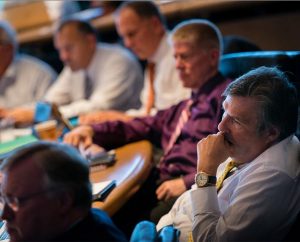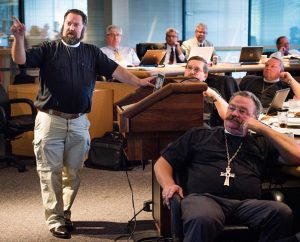By Roger Drinnon and David Strand
roger.drinnon@lcms.org, david.strand@lcms.org
ST. LOUIS — LCMS Council of Presidents (COP) meetings involve a lot more than oversight of administrative issues — council members evaluate weighty matters like theological training for church workers, mercy efforts, cross-cultural outreach and world mission, as they did during their Sept. 20-23 meeting here.
Licensed Lay Deacons
On the first day of the meeting, the council examined data on the number and role of Licensed Lay Deacons (LLDs) throughout the Synod, with reference to 2013 Convention Resolution 4-06A and the ongoing task force to address questions regarding the service of LLDs. Council members discussed the rationale for current LLDs and looked at the expected need for the future. Members also discussed how to ensure theological competency among LLDs and the need to standardize theological training.

The council also identified the need to standardize LLD duties, to work toward consistency in employing them and to clarify the differences between LLDs and Specific Ministry Pastors. The council examined the ministry needs associated with the current 525 ministries being served by LLDs in a time when ordained clergy numbers are up. Synod President Rev. Dr. Matthew C. Harrison noted the need to gather and analyze more data to validate what ministries are being carried out by LLDs, as the Synod currently has a ratio of 225 baptized members per clergy on the Synod roster (the highest in its history). The desired data includes feedback from laity being served by LLDs, financial factors among congregations that are prompting the need and comparisons between districts with and those without LLDs.
Lutheran World Relief
Among the highlights of the second day of the conference was a presentation by Lutheran World Relief (LWR) President and CEO Daniel Speckhard, who provided an overview and update on LWR efforts worldwide.
Speckhard said LWR reached 7.8 million people in 35 countries through 185 projects in 2013, operating with a budget of $45 million.
“We do all of this with efficiency, spending 88 cents of every dollar on program activities,” said Speckhard. “With that remaining 12 percent, we invest in critical activities to our success, such as financial monitoring and oversight; fundraising; infrastructure; and general management of the organization. Our core value of stewardship calls us to employ the highest standards of responsible planning and management of resources. We are not owners; rather, we strive to be wise trustees.”
Lutheran Malaria Initiative
Speckhard continued with an update on the Lutheran Malaria Initiative and related efforts:
“Mercy is LWR and the LCMS working together to educate nearly 2 million people in Tanzania about how to prevent and treat malaria, mercy is 95 percent of children under the age of 5 sleeping under bed nets, after a Lutheran Malaria Initiative program in Kenya,” he said. “Both of these examples are from the Lutheran Malaria Initiative, which I want to lift up as a wonderful example of cooperation. All of the LCMS district presidents agreed to participate in this initiative to bring Lutherans together to help stop the spread of malaria, and I am so appreciative of that kind of support and partnership. We could not have achieved results like this without your support and leadership and the participation of so many congregations.”
We can do more
Speckhard said he hopes LWR’s efforts will expand, because the need is so great in these politically and economically tumultuous times, citing the Ebola outbreak in West Africa; tens of thousands of Central American children arriving unaccompanied at the U.S. border, fleeing violence at home; renewed fighting between Israel and Gaza; conflict in the Ukraine; and the rise of ISIS amid the increasing instability in the Middle East as just a few examples.
“The suffering in the world is so great, and the need so pervasive that we, who have been blessed with so much, cannot be satisfied with the good work we have done. We need to push ourselves to our very limits to bring hope, help and opportunities that will change the course of generations of the lives of families living in poverty around the world,” he said.
Connecting cross-culturally
The Rev. Dr. David Benke, president of the Synod’s Atlantic District and senior pastor of St. Peter Lutheran Church in Brooklyn, N.Y., led a Bible study based on 1 Cor. 11:17-22, where St. Paul addresses a cross-cultural audience to resolve divisions among them. Benke noted that just as Paul spread the Gospel to multicultural audiences in his time, so too is the Synod challenged to do the same amid America’s drastically shifting demographics and varying cultural norms.
“America’s demographics are changing … our outreach needs to go beyond the declining White-Anglo, Northern-European American … populace,” he said.
Benke described what it may have been like for second-century Christians while acknowledging similarities with modern American society. Back then, cross-cultural Christians came together from different nations, speaking different languages and were collectively treated as a “third race” among the mainstream societies of the day.
He explained how a seemingly simple thing like food was a big issue then and continues to be today in the context of cross-cultural fellowship. He emphasized the importance of considering cultural nuances and ethnic sensitivities when outreach efforts involve audiences with cultural backgrounds of which a Lutheran with Northern-European ancestry might not be aware.
Benke emphasized that for Lutherans in cross-cultural ministry, “spiritual formation centered in the church’s meal, Holy Communion, brings a unity with Christ Himself at the center.”
An anthropologist’s perspective
Dr. Jack Schulz, Concordia University, Irvine, Calif., professor of Anthropology, provided additional insight on the impacts of demographics and culture for outreach and mission. During a presentation to the COP, he emphasized that outreach and mission efforts should include cultural considerations while maintaining theological integrity.
Schulz, whose specialized fields include anthropology of religion, American Indians and anthropological theory, said in order to reach out to people from other demographics and cultures, LCMS Lutherans need to acknowledge their own distinct culture, which predominantly comes from Northern-European ancestry.
He said Lutheran cultural awareness is important, especially given that most Lutherans view themselves as ordinary people, without much of a cultural distinction. Schulz’s demographic research shows 95 percent of LCMS Lutherans are white, making them the least racially diverse mainline Christian denomination in the U.S.
Schulz said an alternative approach to outreach and mission involves speaking the Word of God to individuals, not cultures. Getting to know people one-on-one is more important than cultural demographic outreach programs, he said.
President’s Report, Part I
During the first part of the President’s Report, it was announced that the Commission on Theology and Church Relations (CTCR) has completed a document outlining the Synod’s stance on infant and early communion that will be released later this year. The CTCR also announced plans to issue theological statements on Articles VI and VII of the Augsburg Confession and commended the president’s theological statement on mission.
In addition to the revision of Luther’s Small Catechism now underway, President Harrison announced that the Synod will be producing a “Catechism Compendium,” meant for advanced adult study.
Mission update
The Rev. Dr. Albert B. Collver III, LCMS director of Church Relations and director of Regional Operations for the Office of International Mission (OIM), gave an update on mission efforts and related statistics, as of September.

The Synod has workers serving in 36 countries — 90 career missionaries and 47 Globally Engaged in Outreach personnel for a total 137, of which 55 are clergy.
The clergy-lay ratio for career missionaries is 61 percent clergy to 39 percent lay, while the overall ratio for all missionaries is 40 percent clergy to 60 percent lay.
In reference to 2013 Convention Resolution 1-01A, Collver said $1.2 million has been spent on the Global Seminary Initiative to date for Fiscal Year 2013-14. The breakdown includes scholarships given to 25 international students for attending LCMS seminaries (13 at Concordia Seminary, St. Louis, and 12 at Concordia Theological Seminary, Fort Wayne, Ind.). Thirty scholarships went to Ethiopian students; 15 for students in Togo; and 12 for students in Russia. Twenty students were trained in Tanzania and 50 in Madagascar.
In all, 150 people were provided theological education at an average cost of $8,000 per student.
Reflections on China mission
On the final morning of the meeting, retired teacher David G. Kohl presented the COP with highlights from his book (written in consultation with the Rev. Dr. Henry Rowold), Lutherans on the Yangtze, A Centennial Account of the Missouri Synod in China.
Kohl traced the 100-year history of LCMS mission work in China from its beginnings in 1913, through the Japanese occupation in 1937, to the Communist takeover in 1949, to the present day.
Even though Synod missionaries were forced to pull out during those periods of upheaval, they still left their mark on the country, Kohl noted, and the church continued to have thriving ministries in such places as Taiwan and Hong Kong — the latter the home of Hong Kong International School, where Kohl taught art for seven years.
Reflecting on a recent visit to China, Kohl said he met people who still “remember our presence, [and] they are hungry for reinforcements. They want a hero; they want Jesus.”
According to Kohl, 7 percent of the Chinese nation is Christian, “and they’re doing it on a shoestring.” It’s an “exciting field,” he said, “and every person in every LCMS congregation ought to know this.”
President’s Report, Part II
For Part II of his President’s Report, Harrison led the COP through a discussion of a section of Paul Althaus’ book, The Ethics of Martin Luther, focusing particularly on Luther’s understanding of vocation.
“We don’t go running around wondering what we’re supposed to do,” said Harrison. Rather, “God puts us in a place and defines our vocation in that way.” Through our vocations, “we all have our theological callings.” Every station in life, he said, echoing Luther, deserves the same honor and respect as others. There are innumerable stations, and all are useful and in need of the other.
“Everything we touch in life gives us the chance to serve our neighbor joyously,” he concluded. “My neighbor’s need is my vocation for mercy.”
Harrison also urged the COP to adopt a resolution, which it did, commending Concordia Publishing House for the recent publication of its Spanish-language study Bible, La Biblia de la Reforma. Passing out a complimentary copy to each member of the COP, he pointed out what a useful resource this Bible can be for Spanish-speaking members, schools and congregations, noting that CPH is offering discount pricing based on quantities ordered.
The COP next meets Nov. 17-20 in Garden Grove, Calif.
Posted Oct. 28, 2014 / Updated Oct. 29, 2014





So glad to hear our Missions are at work. when and where God calls, we need to respond.